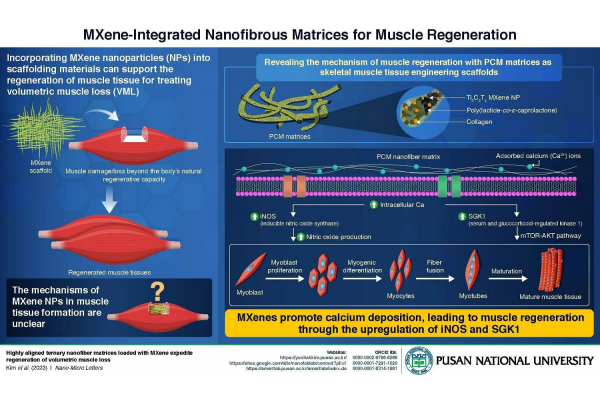Pusan National University Announces Potential Breakthrough for Muscle Regeneration Using Nanotech
January 23, 2024
Source: drugdu
 433
433

Pusan National University announced a potential breakthrough in muscle regeneration technology. Researchers at the university studied MXene nanoparticles (NP) in an attempt to better understand how these nanoparticles work.
In a press release, the university details how a team of researchers used DNA sequencing on nanofibrous matrices which contained MXene NPs. The results revealed the genes and biological pathways that were activated by the NPs.This is considered a breakthrough because up until these findings, the specific mechanism these NPs used to promote muscles was unclear to researchers. Prior to this, MXene NPs were only shown in laboratory demonstrations to promote growth.
The team of researchers includes associate professor Yun Hak Kim, professor Suck Won Hong, and professor Dong-Wook Han. Kim is from the Department of Anatomy and the Department of Biomedical Informatics, while Hong and Han are from the Department of Cogno-Mechatronics Engineering.
MXene NPs could potentially be used in place of traditional muscle grafts.In the press release, Kim said, “This discovery posits a prospective avenue for the utilization of these materials to augment the efficacy of muscle tissue regeneration post-injury or damage.”According to the findings, MXene NPs promote calcium ion deposition around cells, which then triggers the activation of certain genes. These specific genes produce various proteins while also increasing the production of nitrous oxide. The combined result promotes muscle growth.
Now that the researchers have a better understanding of how MXene NPs work, they say that they have a chance to refine the designs of the scaffolds these NPs are used in to achieve better and more efficient results. Kim believes that this research could lead to significant improvements in muscle injury treatments within five to 10 years.
Mike Hollan
By editorRead more on
- The first subject has been dosed in the Phase I clinical trial of Yuandong Bio’s EP-0210 monoclonal antibody injection. February 10, 2026
- Clinical trial of recombinant herpes zoster ZFA01 adjuvant vaccine (CHO cells) approved February 10, 2026
- Heyu Pharmaceuticals’ FGFR4 inhibitor ipagoglottinib has received Fast Track designation from the FDA for the treatment of advanced HCC patients with FGF19 overexpression who have been treated with ICIs and mTKIs. February 10, 2026
- Sanofi’s “Rilzabrutinib” has been recognized as a Breakthrough Therapy in the United States and an Orphan Drug in Japan, and has applied for marketing approval in China. February 10, 2026
- Domestically developed blockbuster ADC approved for new indication February 10, 2026
your submission has already been received.
OK
Subscribe
Please enter a valid Email address!
Submit
The most relevant industry news & insight will be sent to you every two weeks.



